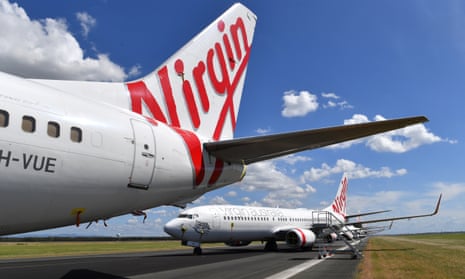Virgin Australia wants emissions reductions laws changed so Australian carriers can buy greener fuel to power other airlines’ planes overseas but be recognised as if it had used the fuel on its domestic flights.
At the Australian Airports Association (AAA) national conference in Melbourne on Tuesday, aviation leaders acknowledged sustainable aviation fuel (SAF) was the only currently feasible path for airlines to reach climate commitments without decreasing their operations.
While airlines struggle with the prohibitive price – on average 2.5 times more than existing jetfuel – and scarce availability globally, Australia’s aviation industry experiences these barriers more acutely, as there is no SAF currently produced at commercial quantities in Australia.
The Australian government’s Jet Zero Council remains in its infancy, having met just once since its formation earlier this year.
With private-sector initiatives years away, Australian airlines must import the fuel source to meet their obligations under the safeguard mechanism, which requires the country’s largest polluters to reduce emissions intensity by 4.9% each year to 2030.
For companies that do not reduce their emissions intensity enough, they must buy carbon offset credits from companies who cut pollution beyond what is required.
However, Virgin Australia’s chief sustainability officer, Christian Bennett, suggested that Australian airlines should be able to buy more readily available SAF to reduce foreign airlines’ emissions and for this to be recognised as having a net benefit under the safeguard mechanism, instead of requiring Australian carriers to import SAF – and burn fuel in the process – or pay for credits under the scheme.
“If we wanted to buy SAF in this country right now we can’t,” Bennett told the AAA conference. “It’s not produced, it’s not commercially affordable and so I think there’s a very delicate policy discussion to be had, because it’s important to distinguish between actually having physical access to SAF and having access to the environmental benefits of SAF.
“Arguably if we’re not going to be able to access SAF physically in Australia for the next decade … we’re going to need to think about innovative mechanisms like booking claim and how we leverage partnerships with countries like the United States to see whether there’s a way that we can actually access the environmental benefits of SAF well before we’ve got the ability to actually physically inject it in our airplanes at Australian airports.
“That’s going to require a delicate policy dance because we would argue that therefore we need to adjust the safeguard mechanism to reflect those credits or else we won’t do it, it doesn’t make financial sense.”
Bennett said emissions reductions commitments could otherwise lead to higher air fares for Australians.
“Ultimately, at the end of the day, we need to make sure that aviation remains affordable for all Australians,” he said. “It would be terrible if we ever got to the stage where ... aviation and travel around Australia became a luxury. We’ve got to avoid that so we need to find the right policy environment.”
after newsletter promotion
Meanwhile, commodity trader Graincorp and IFM Investors – a global investment firm whose portfolio includes major Australian airports – have announced they will conduct feasibility studies into building a series of SAF production plants along Australia’s east coast, exploring the use of waste and residues, crop-based oils and bio-organics.
The initiative will aim for its first plant to produce about 8% of Australia’s annual jetfuel requirement by 2030, the IFM head of asset management, Danny Elia, said.
The GrainCorp chief executive, Robert Spurway, said: “This is an opportunity to help build a valuable new domestic market for Australian farmers and feedstock producers.”
Earlier this year, Qantas announced a plan with the Queensland government and Jet Zero Australia (a private company unrelated to the government’s council) to convert byproducts from north Queensland sugar cane into SAF.
While domestic aviation targets fall under Australia’s own emissions reductions scheme, emissions related to international flights are considered under the International Civil Aviation Organisation’s carbon offsetting and reduction scheme for international aviation.
Commercial aircraft are already using SAF – Airbus says all of its aircraft are capable of flying with an SAF blend of up to 50%. Aviation accounts for slightly more than 2% of global CO2 emissions.
